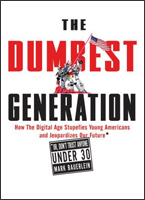Who are You Calling Stupefied?
Who are You Calling Stupefied?
Is the Millenial Generation Stupid?
 According to Mark Bauerlein, the Millennial generation, the approximately 80 million of us born in the United States between 1980 and 1995, takes top honors for collective dim-wittedness. In his new book, The Dumbest Generation: How the Digital Age Stupefies Young Americans and Jeopardizes our Future, Bauerlein, a professor of English at Emory University, argues that Millennials have been endowed with unlimited access to knowledge, but we have never served ourselves from the intellectual buffet before us. Instead, we indulge in hours of Facebook checking, instant messaging, and reality-TV watching. “Teen images and songs, hot gossip and games, and youth-to-youth communication…wrap them in a general cocoon,” Bauerlein says of the Millennials.
According to Mark Bauerlein, the Millennial generation, the approximately 80 million of us born in the United States between 1980 and 1995, takes top honors for collective dim-wittedness. In his new book, The Dumbest Generation: How the Digital Age Stupefies Young Americans and Jeopardizes our Future, Bauerlein, a professor of English at Emory University, argues that Millennials have been endowed with unlimited access to knowledge, but we have never served ourselves from the intellectual buffet before us. Instead, we indulge in hours of Facebook checking, instant messaging, and reality-TV watching. “Teen images and songs, hot gossip and games, and youth-to-youth communication…wrap them in a general cocoon,” Bauerlein says of the Millennials.
Using a variety of studies, Bauerlein paints a discouraging portrait of how Millennials are not only badly informed but complacent. Findings from the National Association for Educational Progress (NAEP) show that 46 percent of American high school seniors lag behind their international peers in “basic” math and science knowledge, and an alarming number of them think Germany was an ally of the United States during the Second World War. To make matters worse, as the number of museums and performing arts venues rises nationwide, the participation and attendance of 20-somethings correspondingly drops.
An epidemic of “bibliophobia” frames these statistics, according to Bauerlein, who quotes a survey respondent saying, “My dad is still into the whole book thing. He has not realized that the internet has kind of taken the place of that.” In a chapter entitled “Screen Time,” Bauerlein derides educators who tout the benefits of high-tech classrooms and interactive educational tools on the Web. If there was an “intellectual payoff” for these tools, Bauerlein says, it would already be demonstrable.
But not providing a desired outcome is a far cry from causing harm, and Bauerlein overlooks this inconsistency. He ignores the challenges that the digital age brings with it. We Millennials are bombarded with information that accumulates at an infinitely faster rate than ever before. The internet provides, and even forces upon us, constant updates in every possible arena. Hundreds of different sources give different and ever-evolving slants on a single event. Due to this continuous barrage of information, our generation’s definitions of truth and accountability must be markedly more discriminating than our predecessors. We are ahead of the curve in our ability to parse this staggering amount of information, but Bauerlein indicts our generation for adapting to the current system.
For me, the greatest flaw in The Dumbest Generation is Bauerlein’s deliberate avoidance of the history Millennials have grown up with. My generation came of age during the Bill Clinton years, when his 1992 campaign anthem, Fleetwood Mac’s “Don’t Stop (thinking about tomorrow),” exhorted us to put people first and believe in our ability to engender change. The words “multicultural” and “diversity” have been part of our everyday lexicon. Our formative years were flanked by two Iraq wars, and our most memorable collective experience is 9/11. Our generation is not guilty of the political apathy that once characterized Generation X, which Bauerlein now ascribes to us.
Our support has helped to galvanize the campaign of Senator Barack Obama, and it doesn’t stop there. In a 2006 survey at UCLA’s Higher Education Research Institute, just over 66 percent of freshman students said it was “essential or important” to help others, the highest percentage in 25 years. We flock to programs such as AmeriCorps, Peace Corps, the New York City Teaching Fellows program, and Teach for America, whose Web site states that the “vast majority” of its recent members are “within five years of graduating college.”
Anybody who has been around a college in the last decade knows that Millennials still read books, write plays, and create art the old-fashioned way. What is different about us is that we also use image-editing software such as Photoshop and Lightroom, music applications such as Logic or Garage Band, and filmmaking programs such as iMovie or After Effects. Much of our creativity is going to be different from that of our predecessors. The question is, will Bauerlein and his generation try to appreciate it or will they oppose it from the start?
Just for fun, I propose a contest. Give one person a stack of newspapers, give the other a computer. Who will be able to get a better sense of the world? My bet is on the person with the computer. That is the promise and also the challenge my generation has been given.
Ilana Garon is a writer living in New York and a certified Millennial.






